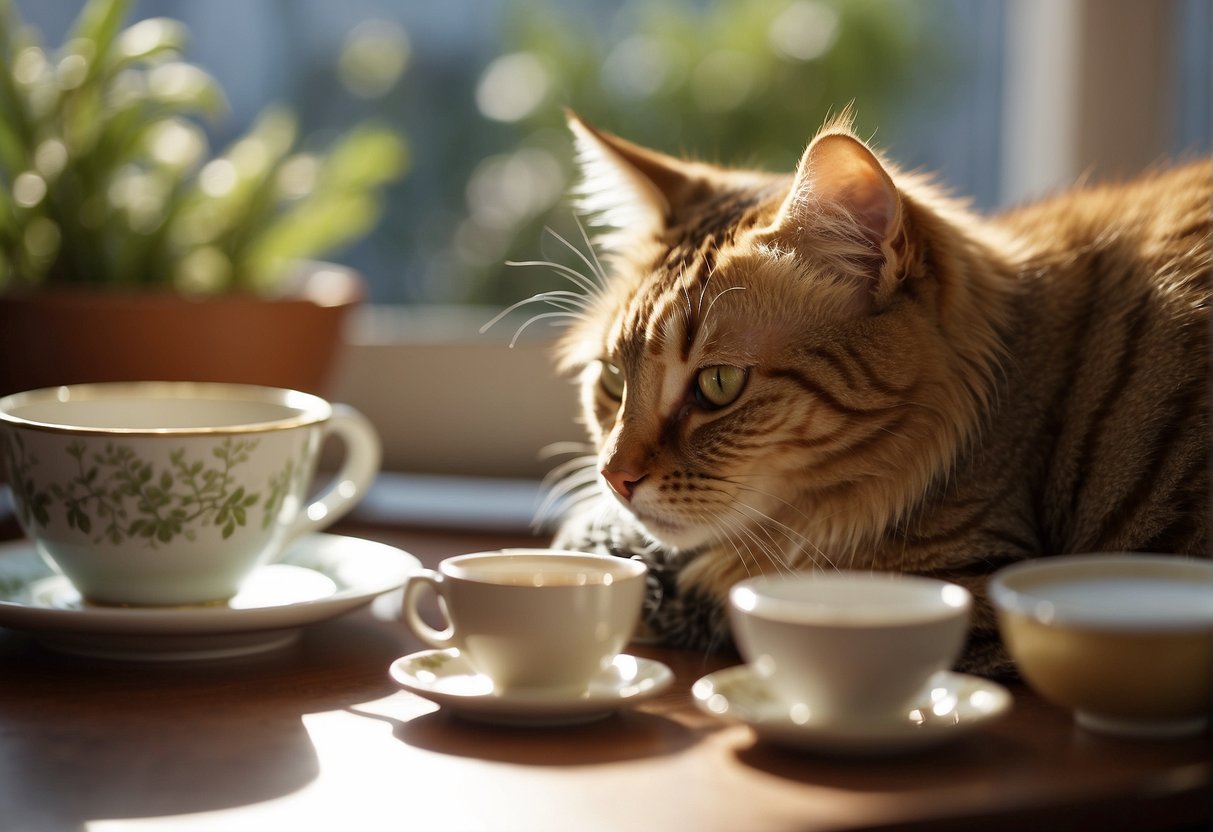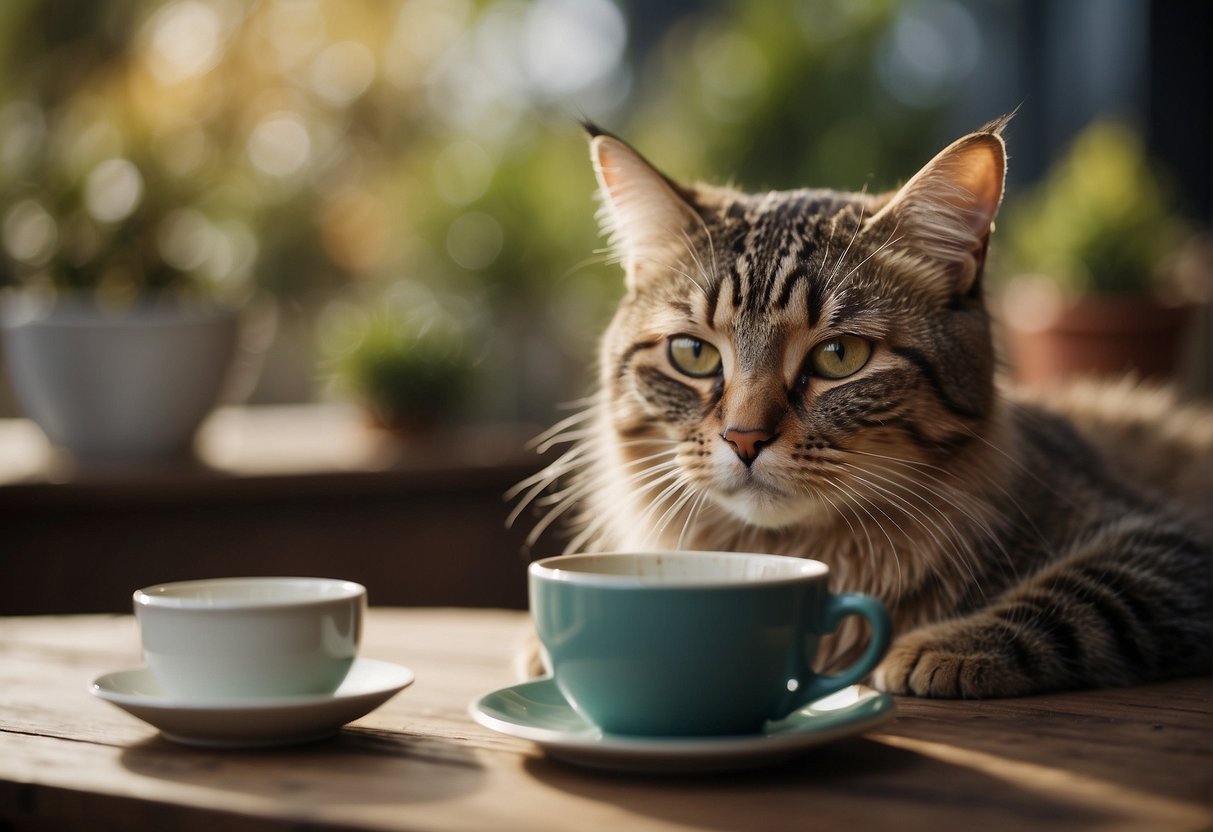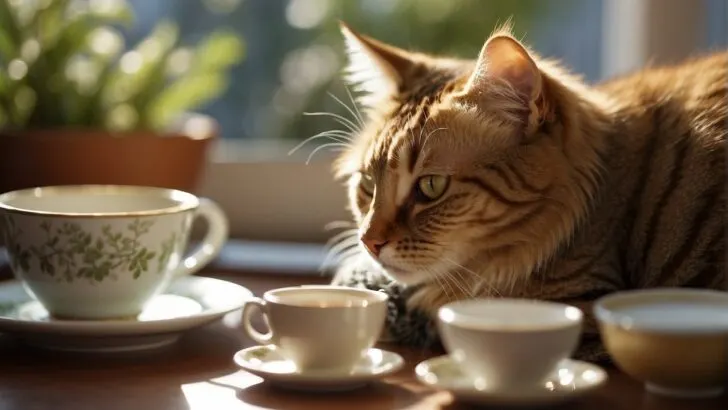Cats should not drink tea as it often contains caffeine, which is harmful to feline health. Even a small lick from a cup of green tea left unintended on the counter can lead to a noticeable change in a cat’s behavior. This may include displaying signs of caffeine toxicity such as restlessness or rapid breathing.
While some herbal teas are considered safe, it’s essential to know which herbs and ingredients are present. For example, I’ve noticed that caffeine-free options like chamomile can be soothing. However, it’s crucial to ensure no other additives are included that could harm your kitty.

Cats are obligate carnivores, which means their bodies are designed to digest and utilize meat, not the plants and herbs typically found in teas.
It’s not just caffeine; various other compounds found in teas can also be troublesome for cats. Some owners have seen benefits in specific herbal teas meant for felines, like those containing catnip or valerian root. These should be administered in very diluted forms and as an occasional treat, not a regular part of their diet.
When in doubt, always consult with a vet before sharing any of your favorite beverages or foods with your cat. It’s safer to stick to clean, fresh water for their hydration needs. This guarantees they stay healthy and happy without the risks associated with human-oriented products like tea.
Potential Risks of Tea for Cats

Tea might be a delightful beverage for you, but it’s important to understand the potential risks it poses to your feline friend. In this section, we’ll explore why tea can be problematic for cats and what you can do if your cat has ingested some.
Caffeine Toxicity and Symptoms
Caffeine is highly toxic to cats and is commonly found in green, black, Earl Grey, and English breakfast teas which all originate from the Camellia sinensis plant. Caffeine poisoning can manifest as vomiting, diarrhea, seizures, tremors, and in severe cases, coma. If you suspect caffeine toxicity, immediately contact a veterinarian.
Toxic Ingredients in Tea
Aside from caffeine, certain teas contain toxic ingredients such as essential oils and components like theobromine, which is particularly harmful. Ingredients like citrus, grapes, and cherries should also be avoided as they can be harmful to cats.
Adverse Reactions to Non-Toxic Teas
Even when a tea is decaffeinated or herbal, there could still be risks. Your cat might experience gastrointestinal upsetfrom ingredients it’s not used to. Some cats may even have allergic reactions.
Specific Teas and Their Effects
Chamomile tea, often viewed as soothing for humans, can be dangerous for cats as it sometimes contains compounds that can cause gastrointestinal upset. Similarly, teas like valerian and mint may invoke unpredictable reactions, even though some cats respond well to catnip tea.
Dealing With Tea Ingestion
If your cat drinks tea, monitor for signs of distress. For any serious symptoms, contact a vet or the Pet Poison Helpline. Until then, offer plenty of fresh water to help flush out their system.
Safe Alternatives to Tea
Instead of tea, provide fresh water or broth to ensure hydration without the risks. You might also consider a gentle herbal infusion specifically formulated for feline consumption.
Herbal Teas for Cats
Certain herbal teas like those made from dandelion root, licorice root, or echinacea can be beneficial for your cat’s immune system and digestive system if they are designed for cats. Always ensure these are non-toxic and free from caffeine.
Understanding Your Cat’s Dietary Needs
Before exploring specific foods and drinks for your cat, it’s crucial to grasp their unique dietary requirements that ensure their health and vitality.
Cats as Obligate Carnivores
Your cat is not just a cute and cuddly pet; they’re a finely-tuned carnivorous machine. Cats are obligate carnivores, which means their nutrition must be rich in protein, amino acids, and certain vitamins and minerals that come from their prey in the wild.
The protein in their diet must provide them with essential amino acids, such as taurine, that they cannot naturally produce in adequate amounts. A deficiency in taurine, for instance, can lead to serious health issues like heart disease or vision problems. Their diet isn’t just about protein, though—they also need certain vitamins and minerals that come from their prey in the wild.
While their ancestors may have consumed minimal amounts of carbohydrates through the stomach content of their prey, domesticated cats have little need for carbohydrates in their diet. In fact, too many carbs can contribute to obesity and diabetes.
Similarly, the idea that cats need milk is a bit of a myth. Many cats are lactose intolerant, meaning that milk can upset their stomachs and cause digestive problems. Water is the best choice for hydration.
When it comes to fats, they’re an important part of your cat’s diet as well, providing energy and helping with the absorption of certain vitamins. But, as with all things, balance is key — too much fat can lead to obesity, while too little can cause health problems.
Tea and Cat Behavior
While you might enjoy a soothing cup of tea, it’s important to know that tea is not suitable for cats due to their sensitive central nervous system.
Tea contains stimulants such as caffeine which can cause adverse reactions in cats, including restlessness and rapid heart rate.
Instead of typical teas, you might consider offering your cat a safe alternative like catnip tea, which can have a calming effect.
Catnip contains nepetalactone, which can act as a natural stress reliever for cats.
- Catnip Tea:
- Soothing: Offering diluted catnip tea can provide a calming experience.
- Behavior: Cats may exhibit typical ‘happy’ behaviors, such as rolling and purring.
When it comes to promoting a tranquil environment to mitigate stress and anxiety in your feline friends, enrichment goes beyond tea.
Think of their environment as a playground for their senses.
Interactive toys, scratching posts, and climbing structures promote healthy and adaptive behaviors that reduce stress.
- The Right Enrichment:
- Physical activities help in expending energy.
- Mental stimulation is key for their cognitive health.
- Emotional comfort can be created with safe, cozy retreats and consistent routines.

My name is James, and welcome to FAQCats!
Along with our team of cat owners, expert pet enthusiasts, and pet professionals, we aim to write engaging helpful, engaging content about cats. At FAQCats we strive to provide content that’s accurate and fun to read. Our team writes about everything related to cats; even the most complex of topics. Through extensive research and caring for our own fur-pals, we’re able to provide something cat owners worldwide will love. Have a look around, and leave us feedback anytime!

